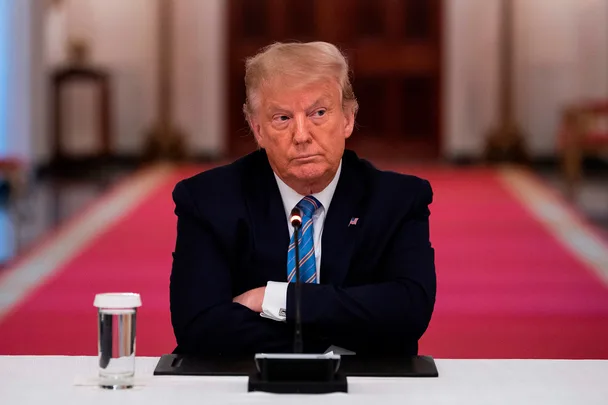Even prior to Donald Trump’s election into office in 2016, the current President of the United States had been using social media as a means to communicate with his (often extremist) followers.
On January 7, incited by the President, pro-Trump rioters took over the Capitol building in Washington, D.C., and made their way into the chambers in what has since been described as a “violent” and “chaotic” display—ending in five deaths.
As a result of the violent scene that unfolded, social media heavyweights such as Twitter, Facebook and Instagram, have permanently banned or suspended Trump from their platforms—at least, for the next two weeks ahead of the inauguration of President-elect Joe Biden—in a hope to stop radical Trump supporters from planning further riots or spreading misinformation about voter fraud.
Below, a list of social media and tech companies who have taken action against Trump following violence at the Capitol.
On January 8, following riots at the Washington D.C. Capitol building, Trump’s Twitter account @realDonaldTrump was suspended indefinitely. The President later attempted to tweet from the @POTUS account, but Twitter quickly deleted his messages and suspended the @TrumpTeam account as well.
“As we’ve said, using another account to try to evade a suspension is against our rules,” a spokesperson for Twitter told People in a statement. “We have taken steps to enforce this with regard to recent Tweets from the @POTUS account. For government accounts, such as @POTUS and @WhiteHouse, we will not suspend those accounts permanently but will take action to limit their use.”
Facebook locked the President’s account on January 6, starting with a 24-hour suspension. By January 7, Mark Zuckerberg took to the platform to explain the decision, as well as extending the block on Trump’s accounts “indefinitely and for at least the next two weeks until the peaceful transition of power is complete.”
Read the full statement below:
The social platform, which is owned by Facebook, also banned Trump from posting for at least the next two weeks, per Head of Instagram Adam Mosseri.
“Given the exceptional circumstances, and the fact that the President has decided to condone rather than condemn yesterday’s violence at the Capital, we are extending the block we have placed on his accounts indefinitely and for at least the next two weeks,” Mosseri said in a statement.
Snapchat
On January 6, a spokesperson confirmed to The Hill that Trump had been suspended from Snapchat amid the riots.
In June 2020, Snapchat had stopped Trump’s account from appearing on its Discover page. “We are not currently promoting the president’s content on Snapchat’s Discover platform,” a Snap spokesperson told Business Insider at the time. “We will not amplify voices who incite racial violence and injustice by giving them free promotion on Discover. Racial violence and injustice have no place in our society and we stand together with all who seek peace, love, equality, and justice in America.”
YouTube
On January 7, YouTube revealed a multi-step plan to stop the dangerous spread of misinformation on its platform—sparked as a response to the riots at the Capitol. “Due to the disturbing events that transpired yesterday, and given that the election results have now been certified, starting today any channels posting new videos with false claims in violation of our policies will now receive a strike,” the company tweeted.
Amazon
Parler, the social media app often described as “Twitter without rules”, was removed from Amazon’s cloud hosting service, Amazon Web Services, on January 9. The app is used by many vocal extremists and conspiracy theorists, including at least one of the Trump supporters who died during the Capitol riot. This means Parler will go offline by the evening of January 10 unless they find another hosting service.
“Recently, we’ve seen a steady increase in this violent content on your website, all of which violates our terms,” the AWS Trust and Safety team emailed Parler Chief Policy Officer Amy Peikoff, per Buzzfeed News. “It’s clear that Parler does not have an effective process to comply with the AWS terms of service.”
Google and Apple also removed Parler from their respective app stores.
Apple
On January 9, Apple officially pulled Parler from its App Store. “We have always supported diverse points of view being represented on the App Store, but there is no place on our platform for threats of violence and illegal activity,” an Apple representative said in a statement, per CNBC. “Parler has not taken adequate measures to address the proliferation of these threats to people’s safety. We have suspended Parler from the App Store until they resolve these issues.”
As of January 8, Reddit has banned the subreddit group “r/DonaldTrump”.
“Reddit’s site-wide policies prohibit content that promotes hate, or encourages, glorifies, incites, or calls for violence against groups of people or individuals. In accordance with this, we have been proactively reaching out to moderators to remind them of our policies and to offer support or resources as needed,” a spokesperson said. “We have also taken action to ban the community r/donaldtrump given repeated policy violations in recent days regarding the violence at the U.S. Capitol.”
Shopify
On January 7, Shopify removed Trump’s official campaign merchandise from its platform by disabling his online stores, trumpstore.com and shop.donaldjtrump.com. “Based on recent events, we have determined that the actions by President Donald J. Trump violate our Acceptable Use Policy, which prohibits promotion or support of organizations, platforms or people that threaten or condone violence to further a cause,” said a spokesperson, per CBS News.
TikTok
On January 7, TikTok confirmed it would be removing videos of Trump’s speeches believed to have incited violence at the Capitol. It is also redirecting hashtags used by rioters like #stormthecapitol and #patriotparty to its community guidelines.
While Trump doesn’t have an account with the image-sharing site, the platform is preventing users from sharing baseless claims Trump has made about election fraud.










